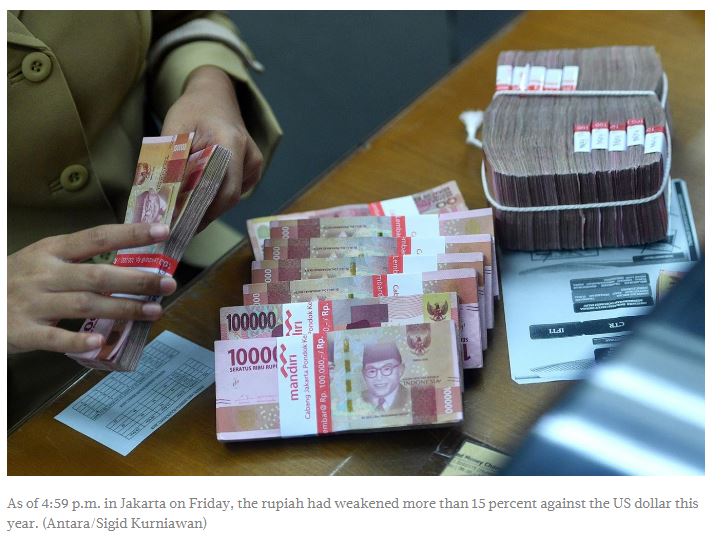Indonesia: Rupiah at 1998 crisis level pressures reserves, foreign-denominated debt
The rupiah breached Rp 16,000 against the US dollar on Friday, the weakest since the 1998 crisis, taking its toll on central bank reserves, corporate debt obligations and import-reliant industries as the COVID-19 pandemic prompts an Indonesian asset selloff.
Bank Indonesia (BI) Governor Perry Warjiyo said on Friday that the central bank had spent Rp 163 trillion (US$10.1 billion) to buy government bonds in the secondary market to stabilize the rupiah as foreign investors exited the market.
“The stabilization efforts that we’ve taken focus on providing a supply of dollars, which we will continue doing through intervention […],” Perry told a teleconferenced press briefing, referring to the central bank’s bond buying and intervention in spot and non-deliverable forward markets.
As of 4:59 p.m. in Jakarta on Friday, the rupiah had weakened more than 15 percent against the US dollar this year. It broke the Rp 16,000 mark during the day, a level unseen since the 1998 crisis. The benchmark stock index, the Jakarta Composite Index (JCI), has lost a third of its value this year.
As of Thursday, a Rp 105.1 trillion capital outflow had been recorded this year as foreign investors dumped Rp 92.8 trillion worth of government bonds and Rp 8.3 trillion in stocks, BI data shows.
“Our foreign exchange reserves are more than enough,” Perry said when asked about the impact of the market rout on the central bank’s dollar reserves. At $130.4 billion in February, Indonesia’s dollar reserves represent 7.7 months of imports, well above the 3-month international adequacy standard.
Bahana Sekuritas economist Satria Sambijantoro said the potential rebound of the rupiah would depend on the government’s efforts to contain the COVID-19 pandemic.
“We think most of the rupiah’s weakness was driven by psychological – not fundamental – factors due to the ‘two-tier pricing’ in the forex market that discourages exporters and bonds investors from holding on to their rupiah-denominated assets, fearing further depreciation,” he wrote.
The government has pledged to allocate Rp 120 trillion (US$7.5 billion) from the 2020 state budget to stimulate the economy, which may grow at the lowest level in 15 years, just above 4 percent, Finance Minsiter Sri Mulyani Indrawati said.
State-Owned Enterprises Minister Erick Thohir said the weakening of the rupiah against the US dollar could also impact state firms’ debts, including flag carrier Garuda Indonesia.
“We have been negotiating regarding the airline’s [condition] for more than a month,” Erick said in a teleconferenced press briefing on Friday. Garuda may need to restructure its foreign-denominated debts as it has struggled to pay its obligations as the pandemic hits the travel industry hard, he added.
Garuda Indonesia issued US$496.8 million in global sukuk (sharia-compliant financial assets) on June 3, 2015. They are due to mature on June 3 with an annual return of 5.95 percent, according to the company’s financial report released in September of last year.
For import-reliant producers, the rupiah depreciation would increase costs in a sector already hit by supply chain shocks resulting from the COVID-19 pandemic.
“If manufacturers want to keep their products competitive in the market, they have to pick a factor of their costs that they can cut, which is their workforce,” said Indef Center of Industry, Trade and Investment researcher Andry Satrio Nugroho.
Andry predicted that the factory activity benchmark, the HIS Markit Purchasing Manager’s Index (PMI), would fall drastically in March. The index managed to climb to expansion for the first time since June at 51.9 in February. A reading above 50 indicates expansion, and one below 50 indicates contraction.
“We have to finish the virus problems first, and then industries can catch up, just like what China is doing right now,” said Andry, adding that the recent stimulus should focus on healthcare instead.
Chamber of Industry and Commerce (Kadin) vice chairman for industrial affairs Johnny Darmawan said on Thursday that the depreciating rupiah would be a further drag on already sluggish business activities due to social distancing measures taken by consumers and enterprises.
President Joko “Jokowi” Widodo on Sunday urged Indonesians to practice social distancing, a public health measure to slow the transmission of an infectious disease by staying 1 meter away from other people in the case of COVID-19. It involves “working from home, studying from home and praying from home”, the President said.
“Production has declined because of social distancing measures to slow down the coronavirus. Business has already been lethargic,” said Johnny.
Manufacturing industry players have complained about the disruption in the supply of raw materials as measures to contain COVID-19 bind factory production across Indonesia. Between 20 and 50 percent of raw materials for domestic industry are sourced from China, Indonesia’s biggest trade partner.
The government previously announced two rounds of stimulus packages including a package worth Rp 22.9 trillion that includes individual and corporate tax breaks. The first package, worth Rp 10.3 trillion and announced on Feb. 25, provides for staple needs and mortgage subsidies for low-income families and fiscal incentives for travel-related businesses.
Indonesia had 369 confirmed cases of COVID-19 and 32 deaths as of Friday. Globally, the pneumonia-like illness has infected over 240,000 people and has claimed at least 10,000 lives. (mpr)
Source: https://www.thejakartapost.com/news/2020/03/21/rupiah-at-1998-crisis-level-pressures-reserves-foreign-denominated-debt.html


 Thailand
Thailand




